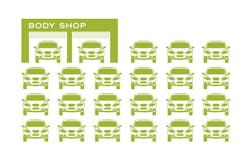You can hardly turn a page today without hearing someone waxing lyrical about the value of lower cycle times to insurers, body shops and customers. Therefore, you would imagine that body shops around the world would have worked out how to significantly reduce them. The strange thing is, most haven’t.
The problem is that pretty much every body shop runs a completely broken process and however much you try to reduce the time it takes from receiving a customer’s keys to the point you give them back, you can only tweak the performance. Why? Because most collision shop owners spend most of their time focusing on efficiencies of staff and processes using sticks and carrots to make people work faster.
But they’re tackling the wrong problem. What needs to be done is to look at what single entity determines output, and especially at what actually stops production. Having spent a lot of time studying this, it’s very clear there are four key things that actually stop production. One is departmentalization.
If we hark back to the good old days of vehicle repair, when we all made money, could decide on which paint we used and didn’t have to go cap-in-hand to insurers for DRP work, you probably remember how much of the repair process you did yourself. You probably did all of the teardown, panel work, even painting and also handed the shiny car back to a beaming customer.
Then, it all changed as insurers wanted economies of scale. DRPs became the in-thing and we all built bigger sheds to repair more cars. In order to gain the efficiency benefit, we departmentalized our businesses into guys that stripped components out, guys that did structural or light panel work, guys that did paint preparation, painters, etc. You made a choice, which career path you wanted to take.Individually, they could repair their area of production more quickly. However, the system ended up with a new enemy—queuing. Think about it. If you drive your shop’s people to work all of the time, to work at high speed (we call that efficiency) in a system with departments, what happens when your panel body technician finishes his task? He passes it on to the paint prep guy, right? Well no, because the paint prep guy is also busy working on another vehicle, which means he can’t yet take the new one.
So the vehicle goes into a queue. It waits until someone from the next department becomes free. It does that for every department change, time and time again.
Departmentalizing your business adds queuing. Queuing adds significantly to cycle time. Now the acid test: Take a look around your body shop. Count the number of productive staff, then count the number of vehicles that have work already in progress. Staff are probably outnumbered 3:1. Vehicles not currently being worked on are in a queue. What’s more, these are adding a huge amount of waste to your enterprise.
Work-in-progress adds no value. It consumes space, heat, light, energy, rent, overheads and of course parts and materials waiting to be invoiced. The only thing it provides is vanity, to a body shop manager that thinks they are busy.
Work-in-progress just adds cost and chaos to your business, and it needs to be driven out. Reducing, or removing departments will increase productivity, reduce work-in-progress, lower costs and significantly reduce cycle time. One answer to reducing work-in-progress is of course obvious, by re-skilling and training people so they can achieve multiple operations. If we can get a body tech to tear down the vehicle, do all of the metalwork, the filler application and apply primer before completely preparing the vehicle for paint, we remove a significant amount of the go-stop-go scenario. There is no queuing between departments, because we have almost eliminated the departments. This is one of the key things we tackle in Bodyshop Revolution, because unless you are prepared to change the complete repair process (and here I mean technology, staff skill-sets, processes, software, remuneration and ideology) then all you can ever do is meddle with the peripherals in order to achieve marginal productive gain.
As I said earlier, departmentalization is just one of four practices that stop work flowing. Next month I’m going to discuss the next—Murphys—the things that unexpectedly go wrong.
Jon Parker is managing director of the Byteback Group, a U.K.-based information technology and services company aimed at advancing the collision repair industry.
